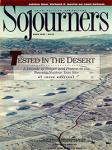As Sojourners goes to press, the pictures of Kurdish refugees by the hundreds of thousands, trapped in the cold, wet highlands of northern Iraq, continue to haunt us. Dying children clinging to each other, mothers and grandmothers carrying dead infants to makeshift burial grounds, swarms of desperately hungry men attacking each other for meager rations, relief packages thrown from airplanes and helicopters as if to herds of cattle below -- all of it brings to mind Paul's classic dictum: "The wages of sin is death" (Romans 6:23).
For it is sin that has brought on this Kurdish deathtrap. It is the sin of George Bush's war -- precipitously entered, murderously carried out, and then vicariously continued at the urging of Bush, who through Radio Free Iraq called upon these same Kurdish people, among others, to oust Saddam Hussein. The sin has continued as an indifferent U.S. administration piously refrained from offering humanitarian assistance to those dying in the mountains, under the pretext of not interfering in Iraq's internal affairs. As if our tens of thousands of bombing missions between mid-January and mid-February were not intervention.
It gives us no satisfaction at all to note that we predicted in these pages the possibility of such a disaster from that August day when the president turned toward a military rather than diplomatic path. Our editorial comment, written at the end of August, said, in part: "Either we take the new and difficult road of multilateral and non-military solutions to the inevitable conflicts between nations; or we continue the old cycle of unilateral intervention and retaliation, leading only to political dead ends and endless human suffering" (see "What Price Oil?," October 1990).
Such prescient warnings give us, we repeat, no sense of vindication before thousands of Kurdish deaths and ominous reports of similar catastrophes among Shiites in the south of Iraq. We wish with all our hearts that they had not proven true.
Nevertheless, we call these warnings and predictions to mind because there are many who say that the Kurdish tragedy could have been averted by a more vigorous pursuit of the war. Had we just prolonged the slaughter four more days, goes the analysis, Saddam's capacity to crush uprisings against him would have evaporated. To this we say again that war is not the answer, and more war is still less the answer. Where would the "logic of four more days" have taken us? Into Baghdad? To an occupation of Iraq? Or to the installation of "our" dictator there?
We continue to believe that Desert Storm, by its own inherent evil, has become Desert Shame. George Bush's war had no chance to accomplish anything good. The end never justifies the means.
America did not "kick the Vietnam syndrome" in the Gulf. Instead, now we are mired in a similar quagmire of human suffering that is a direct result of our ill-advised military adventurism there.
AS PEOPLE OF FAITH, we are compelled to continue disrupting the prevailing consensus. In season and out of season, the biblical ideal of peace must be sounded.
Today in America peace is out of season; its call must therefore be heard with greater clarity than ever. For every triumphalistic word about "success" in the desert, we must counter with a word about the futility of war.
To use a flippant turn of phrase, the "mother of all ticker-tape parades" is planned for New York City on June 10, to honor American forces in the Persian Gulf war. President Bush is invited. In light of what his war continues to spawn -- human tragedy on an overwhelming scale -- that celebration becomes an obscenity. One columnist rightly suggested that the parade be cancelled and its projected costs donated to Kurdish relief.
In addition, we propose repentance on a national scale. We should literally and figuratively put on sackcloth and ashes for our country's sin against millions of innocents in the Middle East. "Who can tell if God will turn and repent, and turn away from fierce anger, that we perish not?" (Jonah 3:9).
Joe Nangle, OFM, was executive assistant of Sojourners when this article appeared.

Got something to say about what you're reading? We value your feedback!